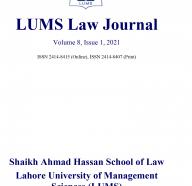
Aims and Scope
LUMS Law Journal is a peer-reviewed journal of Shaikh Ahmad Hassan School of Law, LUMS. The primary aim of the Journal is to provide a forum for scholarly debates amongst law students, faculty, lawyers, judges, practitioners, and experts on important legal issues, which may lead to policy reforms. This Journal is an endeavour to foster a profound understanding of contemporary legal issues among its readers. While maintaining all the standards of academic legal scholarship and integrity, this Journal seeks to inform public discourse by publishing articles that are intellectually rigorous and thought provoking. It aims at providing its readers with a detailed, advanced, and an insightful legal analysis of various ongoing developments in the legal arena in Pakistan and abroad. It is intended to stimulate interest in all matters pertaining to law, with an emphasis on matters arising from the relationship of law to other disciplines.
For the realisation of its objectives, the Journal draws on the academic rigor and excellence of various students, faculty members, lawyers, judges, and practitioners by featuring their valuable contributions in the Journal. The Journal strives to uphold its vision of publishing challenging and useful legal scholarship of highest academic quality, a vision that is true for all times.
Permissions information
Unless otherwise noted, copyrights for the texts which comprise all issues of the LUMS Law Journal (LLJ) are held by the Lahore University of Management Sciences (LUMS). Items published by the LLJ may be freely shared among individuals, but they should not be republished in any medium without express written consent from the author(s) and advance notification to the LLJ Editorial Board. For permission to reprint articles published in the LLJ, please contact the editorial board at submissions.llj@lums.edu.pk.
Facts and views published in the LLJ express the opinions of the authors. While the information in the LLJ is believed to be true and accurate at the date of its publication, neither the editors nor the publishers or the authors accept any legal responsibility for any errors or omissions that may be made or for the results obtained from the use of such material.
A Note from the Editors
Published annually, the LUMS Law Journal is the premier journal of legal scholarship in Pakistan. It is devoted to elaborating substantive areas of law by employing a diverse approach towards examining both national and international legal developments. We are delighted to present the Eighth Volume of the Journal.
This volume includes eight articles, two case notes, and a book review, covering a wide variety of subjects relevant in the Pakistani and international contexts. Shayan Manzar tracks the jurisprudential development related to Article 184 (3) of the Constitution of Pakistan across various cases from 1973 to 2019. Raas Nabeel explores different manifestations of law in three dystopian novels. Muhammad Munir analyses recent cases of selected family courts to determine whether the official time frame for the disposal of family cases is followed in practice. Momal Malik, Ali Hussain Gilani, Hassan Kamal, Shanzay Javaid, and Zoha Adeel Allawala make a case for incorporating the concept of matrimonial property in the Pakistani legal system by utilising various arguments - Islamic and otherwise - and propose the best way forward. Adeel Hasan and Maha Malik trace the roots of Shia inheritance laws for childless widows of deceased Shia husbands from the early Islamic period to current times and emphasise the need for legislative reforms to protect their equitable interests. Areesha Jawad Butt analyses the Nikahnama and the role of the Nikah registrar to pinpoint various loopholes and issues contributing to procedural deficiencies that prevent its effective implementation. Shaista Anwar explores the need for a paradigm shift away from punishing Non-State Actors under domestic law for legitimate acts of war to ensure the observance of International Humanitarian Law. Kamran Adil critically reviews the contribution that the Eighteenth Constitutional Amendment has made within the legislative domain to the implementation of criminal law, criminal procedure, and evidence law, vis-à-vis the relations between the federation and the provinces. Muhammad Usman Mumtaz provides a nuanced insight into the case of The Jurists Foundation v Federal Government PLD 2020 SC 1, which focused on the extension in the tenure of the Chief of Army Staff and analyses the amendment in the Pakistan Armed Forces Act 1952 made to cater to the gap in the law. Hassnain Raza's case note on Ghulam Hussain v The State uncovers the approach taken by the Supreme Court in reconciling conflicting definitions of terrorism under the Anti-terrorism Act 1997. Aimen Akhtar pens down a review of ‘Change is the Only Constant’ by Justice (r) Fazal Karim, focusing on the ubiquity of evolution in legal regimes.
We thank the contributors for their submissions to this edition of the LUMS Law Journal and their cooperation with countless rounds of reviews. The publication of this volume would not be possible without the constant guidance and cooperation of our Chief Editor, Dr. Zubair Abbasi, and Co-Editor, Ms. Marva Khan, to whom we owe immense gratitude. We are also grateful to the Editorial Committee of the LUMS Law Journal, whose diligence, perseverance, and commitment towards producing fine legal scholarship made this publication possible.
The LUMS Law Journal aims to produce legal scholarship that is engaging, critical, and drives important and challenging conversations. We welcome feedback, suggestions, and recommendations. Please write to us at submissions.llj@lums.edu.pk.
Student Editors
Maha Malik, Momal Malik, and Semra Islam

